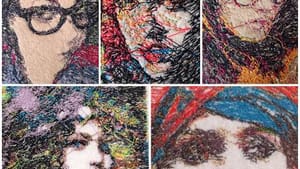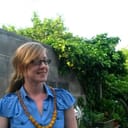Stay in the Loop
BSR publishes on a weekly schedule, with an email newsletter every Wednesday and Thursday morning. There’s no paywall, and subscribing is always free.
Art and social justice: A common thread at POST

Philadelphia’s Bonnie MacAllister is fusing art and social statements. With her latest fiber works, she is embroidering images of influential women around the world, and you can see her work for yourself during the annual Philadelphia Open Studio Tours POST East dates, featuring studios east of Broad Street, on October 3 and 4.
MacAllister attributes much of her love of fiber arts to her grandmother. When she was young, they would read books on knitting and sewing together. That’s where she learned to appreciate being hands-on with her work, even spinning her own thread, which she learned to do when she went to Ethiopia six years ago on a Fulbright-Hays award.
“I think a lot about Ethiopia…and I’m still drawing the women I met there,” MacAllister says. Every time she spins thread now, she thinks of that culture.
Many aspects of the fiber communities in Ethiopia she visited appealed to her, but one thing stood out. She loved the community itself and the bonds that fiber arts — from spinning and weaving to sewing and knitting — created.
Sewing for the world’s true heroes
“The families work together on weaving, it’s cooperative, but I think a lot of fiber work is like that,” the artist says of learning about fiber, showing it to other people, and keeping the tradition going. “For me, I know I have things I didn’t learn from my grandmother, but because now I’m part of the Philadelphia Guild of Handweavers, I’m learning from all of those people over there. I feel like I found what I really wanted to do with my art.”
Prior to the embroidery, MacAllister focused on painting and poetry. In 2014, she was involved in The Ragdoll Project, a community-based art project creating awareness about human trafficking. Through Philadelphia Women’s Caucus for Art, women made ragdolls by hand; the dolls have since traveled to galleries and events internationally. All proceeds from the project continue to go directly to women in America and abroad who are survivors of human trafficking and sexual exploitation.
“After we sold those ragdolls I couldn’t stop sewing, and I really started these embroideries after that,” MacAllister says. “It was really getting in touch with everything that bothered me, everything that bothered me about human trafficking and the things that are wrong in the world.” She wanted her art in thread to reflect “the people that were heroes.”
Drawing and thread meet machines
In Philadelphia, there are a few communities that MacAllister is involved in that help nurture her artistic growth. At NextFab, a manufacturing co-operative in South Philadelphia, she uses machinery to make the embroideries.
To create her recent works, MacAllister starts with a drawing or sketch of a photograph, which she is then able to scan into the machine.
“You hand-feed every single thread, it’s more like painting and using the arm of the machine to help guide it,” she explains. “I get to do a lot of really straight lines and forms, just like an outline, almost like a line drawing in thread, and then on top of that I build little layers of hand-sewn embroideries.” Each portrait, even working collaboratively with the machine, can take days to create.
As for incorporating social issues into her art, it seems to come naturally to MacAllister. She finds it not only therapeutic for herself, but also for everyone involved. Working with like-minded community groups through art-making taught her that it’s “very comforting to a lot of people who are survivors of different violence to come together and sew together, to come together and paint a mural, to come together and knit-bomb a neighborhood.”
She says she’s always channeled things into her art, and it’s great to see how constructive that collaboration can be.
Visit Bonnie MacAllister during POST East from noon to 6pm on October 3 and 4 at CultureWorks Greater Philadelphia, located in the Philadelphia Building at 1315 Walnut Street, Suite 320. POST West artists are opening studios west of Broad Street on October 17 and 18. All visits are free.
Sign up for our newsletter
All of the week's new articles, all in one place. Sign up for the free weekly BSR newsletters, and don't miss a conversation.

 Aja Beech
Aja Beech